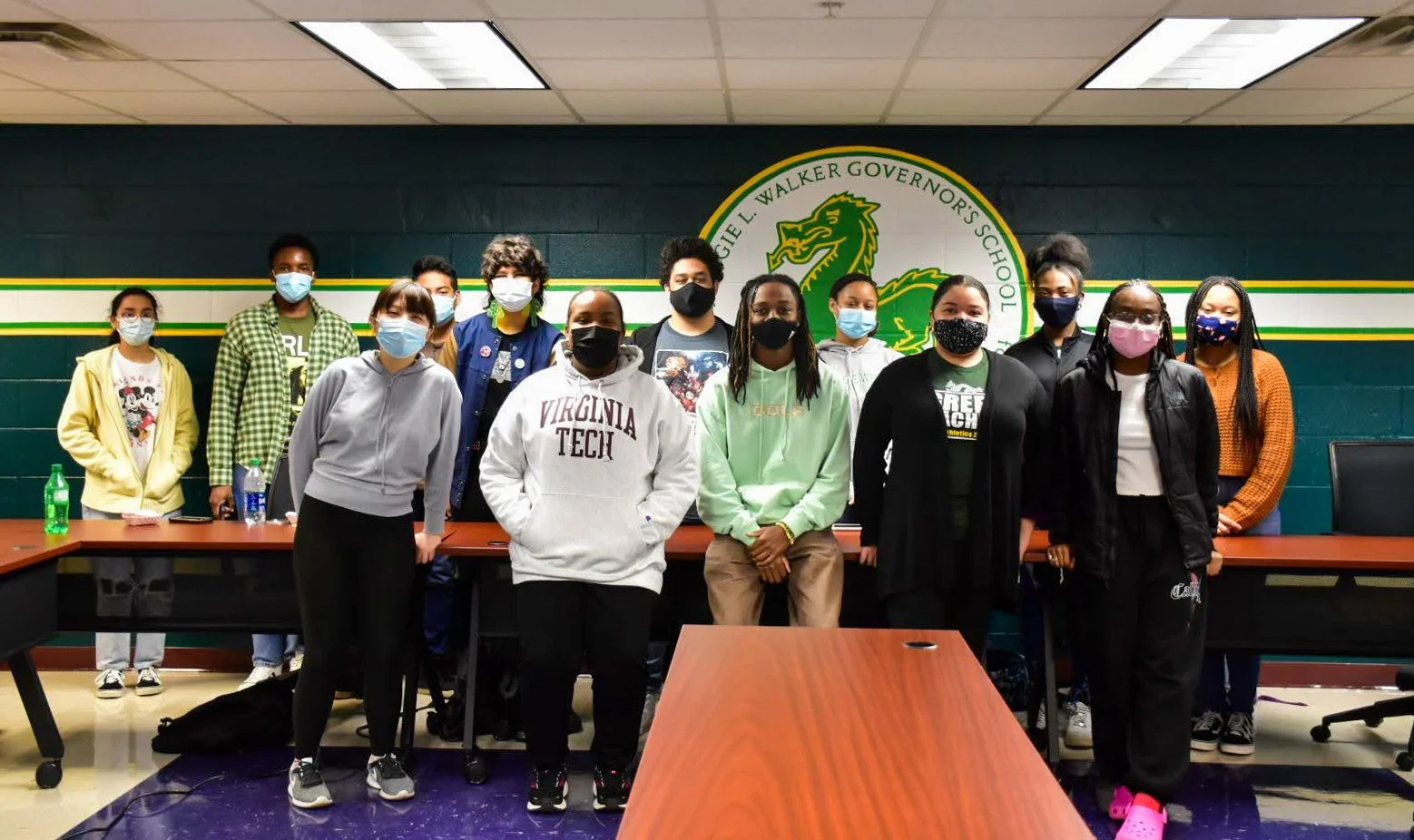PROJECT 1937
JANUARY 2022
Finding Community and Collaboration Through Maggie Walker’s Peer Mentors
By Zachary Mazzo and Tanvi Palavalas
Photo: Grace Yoo / The Peer Mentors Club. In room 153, a small group of students meets, comprising Maggie Walker’s Peer Mentors program. In the highly academically rigorous environment at school, Peer Mentors exists to support students and to build connections.
“At the time, it was mostly for African American students. When I came to Maggie Walker in 2008, another teacher at the time pulled me in. It was going really well, and opened up to anybody that wanted or needed some additional support,” said Ms. Joy Cobb, Maggie Walker’s sophomore-junior counselor and one of the faculty sponsors for Peer Mentors along with Ms. Nakita Lee and Dr. Lisa Williams.
Founded in 2005 by a former counselor at Maggie Walker, the Peer Mentors Club is modeled after the UVA Peer Mentors program designed to provide emotional, academic, and social support for underrepresented minority students.
Similar to the buddy system often used in elementary schools, students in Peer Mentors are matched in a family pod, consisting of one student from every grade level. The goal behind the club is to foster a sense of community and to educate students about the different opportunities available at Maggie Walker. “Our community is just like a family. We have conversations about our school day, things we’re a part of outside of school, and activities we can do together,” said Jaliyah Hairston (‘24).
“Sometimes it might be advice or just social support. They’re almost like a role model, or an older buddy. Somebody to think of as a first line of defense and really connect with,” Ms. Cobb added.
For many students involved, arriving at Maggie Walker can be a culture shock, especially for students from smaller counties with few represented students, let alone students of color. Peer Mentors, however, works to bridge that gap and provide students a welcoming and meaningful environment, no matter their background.
“One of the things I’ve noticed is that we’re open to anybody, so we tend to still get minority students that will come to feel safe. Anyone who needs it is welcome,” Ms. Cobb explained. “Students can have that place where they can say, ‘Okay, I have people who might not look like me, but understand what I'm going through, and I don't have to explain. I can just be myself and feel safe.’”
Students in Peer Mentors describe the environment as encouraging and refreshing, including Bobbi Taft (‘22): “The community within the club is very uplifting and supportive. We are all here for one another and we know if there are any concerns, questions, doubts, and so on. Peer Mentor meetings always brighten the rest of my day.”
Jaliyah Hairston added, “I have noticed that this club allows students to take a breather from the stresses of classes, administrators, and the nature of just being growing teens. We’re an open space for all different types of minority groups, and we can find common ground.” When asked about the culture and environment of the club, she said, “It has made me feel like there is hope for the minorities of Maggie Walker and that we soon will have a widely diverse community if we have the right conversations, meetings, and activities.”
Peer Mentors serves as a safe space for many students, fostering a sense of community. “I support other students by providing a space for minorities to be open about their feelings, allowing students to come to me after meetings to talk about their personal experiences, and just providing time to relax from the stresses of being one of the few minorities in a class,” said Bobbi Taft.
Ms. Cobb, Ms. Lee, and Dr. Williams have several plans for the future of Peer Mentors, including different cultural awareness activities and various volunteer opportunities throughout the year. “Starting in January, we’ll be doing some bulletin board activities around the school to advertise the Walker Way,” she mentioned. Created by Dr. Williams, the Walker Way emphasizes four values that act as a foundation at Maggie Walker in clubs and academics: Courage, Community, Collaboration, and Cooperation.
The club is also eager to visit different colleges in hopes of giving younger students exposure to future opportunities. In the past, Peer Mentors has visited the Maggie Walker House and the Black History Museum. Additionally, in 2019, the club sold soul food during the annual Fall Fest celebration to raise money. “We were able to buy club shirts and go on a field trip to the Black History Museum of Richmond down the street. I learned a lot from that museum trip,” recalled Nonso Akunwafor (‘22).
Through aiming to construct an inclusive area for all students, Peers Mentors cultivates community alongside embodying the core values of the Walker Way, Peers Mentors cultivates community alongside embodying the core values of the Walker Way, providing numerous students with a safe and welcoming space that all students at Maggie Walker deserve to have.

